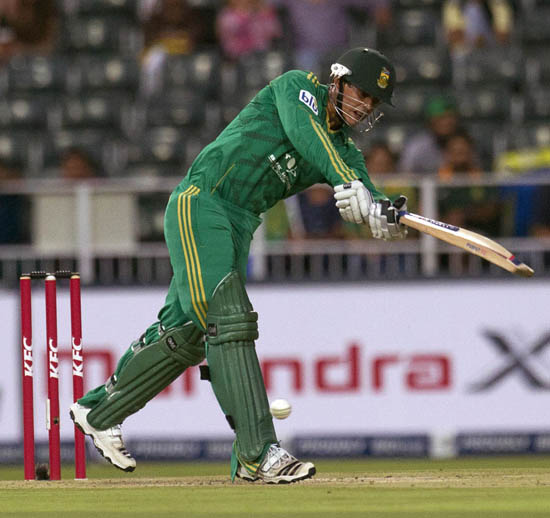Johannesburg: After six weeks of tussling in the Arabian Desert, the South African and Pakistan teams would have been grateful for the freshness of rain. Just not on match day. South African skies burst to interrupt what seemed set to be the most competitive Twenty20 match between these two sides in the recent past and the hosts won by four runs, according to the Duckworth-Lewis method.
The host batsmen began like the fierce downpour which swept across the ground forty minutes before the scheduled start of play, but Pakistan pulled them back to little more than a drizzle. In reply, Pakistan built themselves up to a position from which they could have produced a storm themselves. But the real thing intervened before any of that was possible to deny the sizeable Wanderers crowd a potentially thrilling finish.
After being sent in, Hashim Amla and Quinton de Kock powered their way to 69 runs off the first seven overs, making Pakistan’s decision to field first look questionable. Their seamers, including the experienced Sohail Tanvir – who has played regularly at this ground for the Lions – to the relatively new Anwar Ali, and even Junaid Khan, could not adapt to conditions. The bowlers sprayed the ball wide and their lengths were too full.
De Kock and Amla put on a fireworks display of aggressive shots in response. Amla spanked the ball through the covers, de Kock used his wrists to smoke the ball through the leg side. Runs rained from their bats even as debutant Bilawal Bhatti showed the first threat, inducing an outside-edge from de Kock, which scooted to the third-man boundary.
Pakistan had opted to leave out Saeed Ajmal, a choice which appeared to be wrong until Mohammad Hafeez brought himself on and enjoyed immediate success. Amla was bowled when he came forward to drive. De Kock followed him in Hafeez’s next over, when he mis-hit a ball to long-on and Tanvir took a well-judged catch on the boundary.
Soon Shahid Afridi had Henry Davids cramped for room, prodding awkwardly only to be bowled, and Pakistan had taken three wickets for 15 runs. Afridi, bowling quicker than usual, did not concede a boundary in his spell. In the eight-over period in which Afridi and Hafeez bowled, the pair gave away only 32 runs.
Pakistan’s main concern was the rest of the bowling. Bhatti’s debut got better when he was brought back on and he bowled a back-of-a-length ball to dismiss JP Duminy for his first international wicket. Duminy pulled off the front foot but got it only as far as midwicket where Hafeez took the catch falling forward.
David Miller countered that length better, sending Bhatti over the scoreboard for the only six of the innings and ensured South Africa finished fairly strongly. They scored 46 runs off the last five overs but Pakistan would still have been satisfied with their efforts. From 9.8 runs an over in the first seven, Pakistan allowed a rate of 6.46 through the next 13 and had a realistic chance at a successful chase.
Pakistan’s reply began fortuitously, with five wides from Lonwabo Tsotsobe but soon settled. Ahmed Shehzad started in a manner befitting his ranking as the leading T20 run-getter this year, flicking Dale Steyn down to fine leg and cracking the bowler over point. He grew over-confident when he tried to run the ball behind point but was foxed by extra bounce from Tsotsobe and played on.
Mohammad Hafeez negotiated a Dale Steyn over which ended with the Pakistan captain timing a full ball past mid-on. Nasir Jamshed seemed to settle in the same way, when he pulled Morne Morkel in front of square, but was surprised by the extra bounce and played a couple of nervy edges which went for four.
His stay at the crease ended when he pushed at Duminy’s third ball and the offspinner stretched full length to take the return catch. Pakistan promoted Umar Akmal to No.4 but he was at the crease for just 10 balls before the heavens opened to leave Pakistan wondering what could have been.
South Africa 153 for 7 (de Kock 43) beat Pakistan 60 for 2 by four runs (D/L method)

